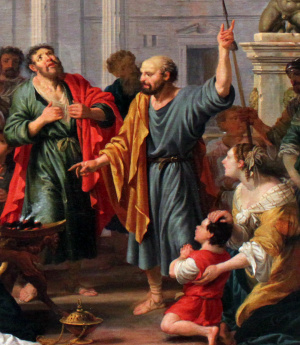Whatever distant rumor might have reached the Jerusalem Christians of Paul's conduct at Damascus or retirement in Arabia, they could not believe that Paul was really a disciple. It took Barnabas to smooth the path forward.
The Son of Consolation
Barnabas, "the son of consolation" (Acts 4:36), already known to us as a generous contributor of his wealth to the poor (Acts 4:36), made a difference in the life of Paul. He came forward, when all others were fearful (Acts 9:26), and personally brought him to the Apostles (verse 27).
It is probable that Barnabas and Paul were acquainted with each other before. Cyprus is within a few hours' sail from Cilicia. The schools of Tarsus may naturally have attracted one who, though a Levite, was an Hellenist. It is there the friendship may have begun, which lasted through many vicissitudes, till it was rudely interrupted in the dispute at Antioch (Acts 15:39).
When Barnabas related how Jesus Christ had personally appeared to Paul, and had even spoken to him, and how he had boldly maintained the Christian cause in the synagogues of Damascus, then the Apostles laid aside their hesitation. Peter's argument must have been what it was on another occasion, "Therefore, if God also gave them the same gift that was given to us, who believed on the Lord Jesus Christ, who was I to dissent?" (Acts 11:17, HBFV).

Paul Accepted
Peter and James, the Lord's brother, the only other Apostle who was in Jerusalem at the time, gave Paul "the right hands of fellowship." And he was with them, coming in and going out, more than forgiven for Christ's sake, welcomed and beloved as a friend and a brother, especially by Barnabas.
The first meeting of the fisherman of Bethsaida (Peter) and the tent-maker of Tarsus (Paul), the Apostle of the circumcision and the Apostle of the Gentiles, is passed over in Scripture in a few words. The Bible does not linger in dramatic description on those passages which a mere human writing would labor to embellish.
What took place in the intercourse between Peter and Paul, what was said of Jesus of Nazareth, who had risen and ascended, and become "head over all things to the Church," what was felt of Christian love and devotion, has not been revealed, and cannot be known. The intercourse was full of present comfort and full of great consequences. But it did not last long. Fifteen days passed away (Galatians 1:18), and the Apostles were compelled to part. It would ultimately be Barnabas who would offer the greatest encouragement in the ministry of Paul.
Death Threats
The same zeal which had caused his voice to be heard in the Hellenistic Synagogues in the persecution against Stephen, now led Paul in the same Synagogues to declare fearlessly his adherence to Stephen's cause. The same fury which had caused the murder of Stephen, now brought the murderer of Stephen to the verge of assassination.
Once more, as at Damascus, the Jews made a conspiracy to put Paul to death and once more he was rescued by the anxiety of the brethren (Acts 9:29 - 30). He would have to wait for another opportunity, through Barnabas, in order to spread the gospel far and wide.
Reluctantly, and not without a direct intimation from on high, Paul retired from the work of preaching the Gospel in Jerusalem. As he was praying one day in the Temple, it came to pass that he fell into a trance, and in his ecstasy he saw Jesus, who spoke to him, and said the following.
"Hurry, and get out of Jerusalem with all speed, because they will not receive your testimony concerning Me" (Acts 22:18, HBFV).
Paul hesitated to obey the command, his desire to do God's will leading him to struggle against the hindrances of God's providence and the memory of Stephen.
But the command was more peremptory than before, "Depart, for I will send thee far hence unto the Gentiles." The scene of his apostolic victories was not to be Jerusalem.
For the third time it was declared to Paul that the field of his labors was among the Gentiles. This secret revelation to his soul conspired with the outward difficulties of his situation. The care of the Eternal gave the highest sanction to the anxiety of the brethren. Paul suffered himself to be withdrawn from the Holy City and to await, through Barnabas, the next major opportunity to spread the gospel.